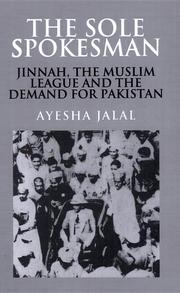
The founder of Pakistan, Muhammad Ali Jinnah, perhaps accrues more condemnation than any other leading figure of Indian nationalism. Ayesha Jalal challenges the orthodox British and Indian interpretations of Jinnah with The Sole Spokesman, a book that examines Jinnah within the context of the All-India Muslim League and the Gordian knot of Indian politics. One of the most successful lawyers in the British empire, Jinnah began his political life as an Indian nationalist, not a Pakistani separatist. But Gandhi's religious revivalism offended Jinnah's taste for secular legalism; in response, Jinnah drifted out of the Indian National Congress as Gandhi rose to power in the 1920s. Jinnah began pursuing a policy of protected electoral rights for Muslims. Opponents found Jinnah unwilling to break even after substantial electoral defeats that revealed the tenuous grip he held over typical Muslim interests. Despite the odds, he "stayed in the saddle" and relentlessly pursued his objective of securing Muslim political rights throughout the subcontinent (and not just in the eventual regions of Pakistan). He played a dangerous game, and though he never got what he wanted--constitutional protections in a united India--he did not quite lose. His political positions sometimes appeared foolish (even dangerous), but not from the slim purchase that served as his foothold for power--he created a perceived need for a strong Muslim center.
The British empire, throughout the early twentieth century, enhanced the power and status of India's provincial governments in order to undermine the drive for nationalist politics under the banner of Indian National Congress or the Muslim League. Strong provincial politics, the British thought, could prevent a national revolution. But in response, the Muslim League began to whisper communalist fears into the ear of Muslim majority provinces such as Punjab and Bengal; the Muslim League hinted that only a strong nationalist Muslim movement at the center could protect Muslim interests in the periphery. The Muslim League consolidated their gains during the Second World War, when the Congress National Party rallied behind Gandhi's 'Quit India' movement, which quickly led the British to arrest all the major figures of Congress. The League, on the other hand, offered wider support for the war effort. As the war concluded in Allied victory, the raj freed the leaders of Congress and pursued further negotiations for a transfer of power, thus ending the Muslim League's brief dominance in the politics of domestic India.
At the close of the war, the Muslim League's siren call of 'Hindu India' exacerbated communal tensions (and led to real bloodshed), but gave Jinnah an increasingly powerful stake in the politics of self-rule vis a vis the British raj and Congress. Interestingly, Jinnah did not speak the same language as the Muslims in Punjab and Bengal--the very Muslims he tried to cater to ensure they supported his drive for a strong center. Ensuring the capitulation of Punjab and Bengal into the house of the Muslim League required some manipulation on the part of Jinnah, for he gambled with their money. "The Punjab and Bengal would never vote to partition their provinces," Jalal writes, "and if they realised that a vote for Pakistan was a vote for partition, they would reject Pakistan." Thanks to Jinnah's party operatives, voters on the periphery never quite gathered that this would be the eventual outcome of a Pakistan's independence. Indeed, Jinnah did not want such an outcome, but he came to accept it when Mountbatten and Nehru rushed the process along in the spring and summer of 1947.
As the hour sounded on Indian independence, Jinnah found himself at the head of a Pakistan that poorly suited the interests of most Muslims--a 'mutilated and moth-eaten Pakistan' that perpetuated communal and inter-state violence well into the twenty-first century. Jinnah fought for Muslim rights in India, but instead he received Pakistan. Viceroy Mountbatten, the last leader of the British raj, receives a poor score from Jalal for failing to understand Jinnah's complex political position, and instead ripping apart Pujab and Bengal in the drive towards Indian independence. The penultimate viceroy, Archibald Wavell, receives a compassionate and high score for his astute understanding of Jinnah's political position as well as the federalist structure required to ensure maximum Muslim League cooperation. In Jalal's argument, the partition of India was a horrible mistake, not a political necessity.
The book's arguments require its author to justify Jinnah's action ex post facto; Jalal's detective work makes use of her sources to paint an overwhelmingly vivid portrait of Muslim politics (though Jinnah himself could use a little more color). In Jalal's book, Jinnah stands as a preference-reading politician facing exceptional circumstances--a depiction that stands somewhat odds with more compassionate sketches of him, such as found in the Oxford Dictionary of National Biography. At her best, Jalal reveals the political limitations of Jinnah, and the personal limitations of figures like Gandhi, Nehru, and Mountbatten when confronting Jinnah's complex legal mind. The book represents an important corrective to the popular depictions of Jinnah as an uncompromising man hell-bent on creating 'Pakistan' in a search for political power. Jinnah, rather, attempted a practical and legal approach to Indian independence, but found that Hindu and Muslim revivalism created a slick slope that he could not easily slalom. Many thousands perished upon the birth of an independent India and Pakistan, but Jinnah--the 'sole spokesman'--cannot bear the sole blame for the complex realities of the region's post-colonial politics. From village, to province, to nation, and from Congress, to Raj, to League, Ayesha Jalal's study traces a witheringly difficult path through India's colonial history.
 RSS Feed
RSS Feed